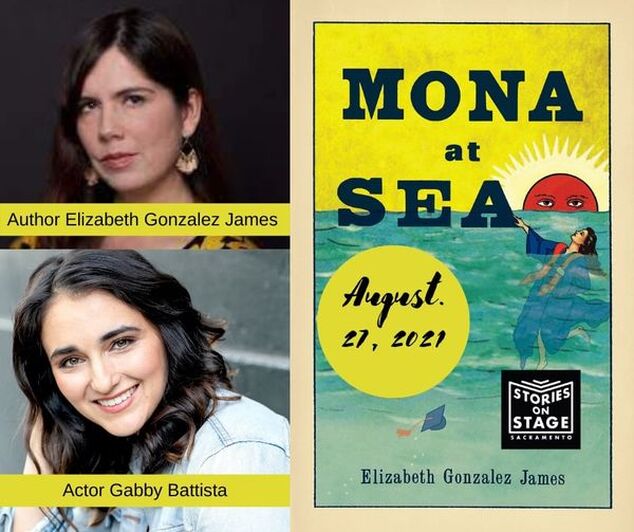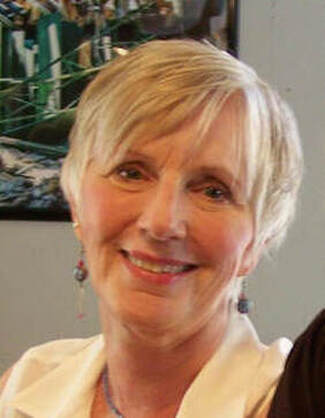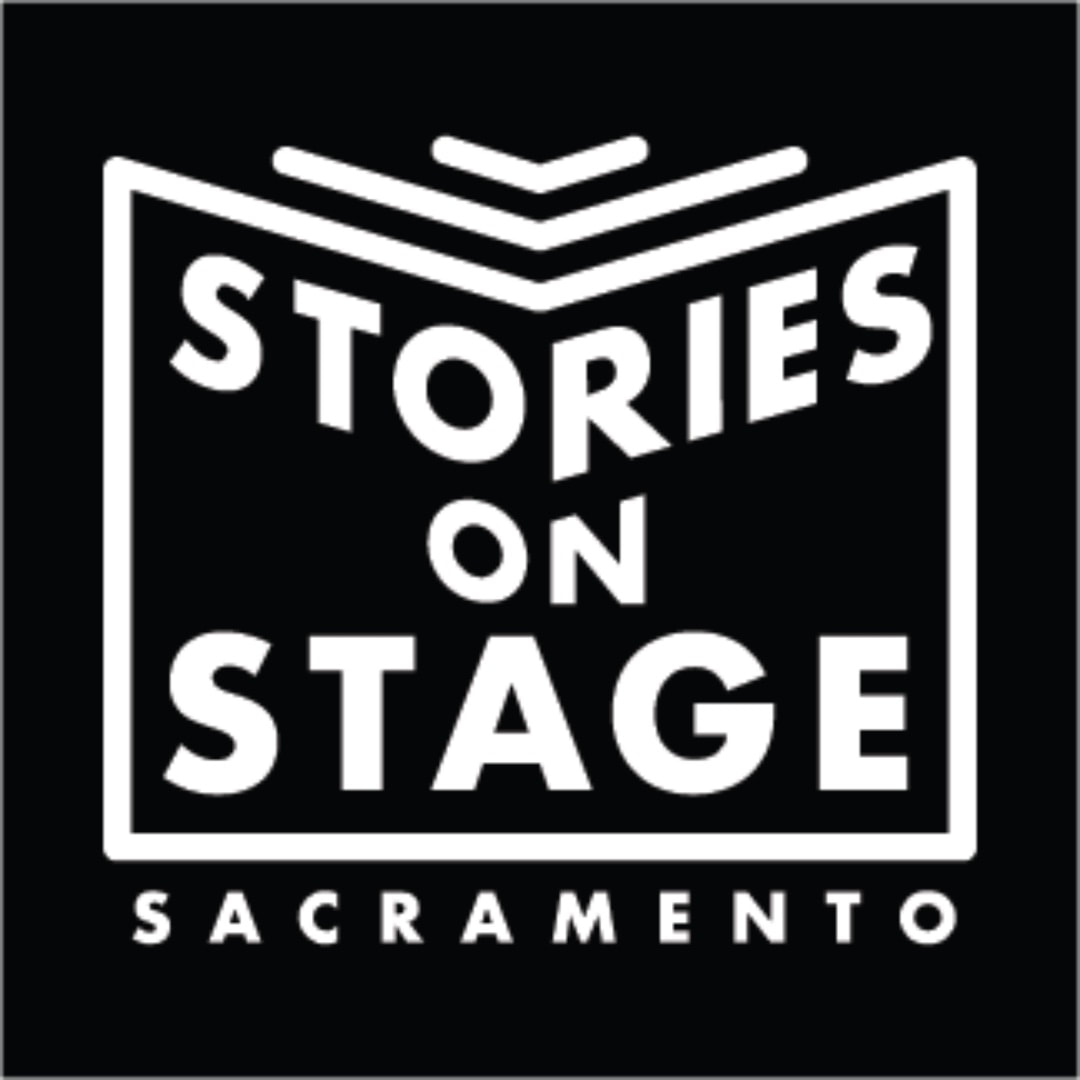|
This month’s featured novel, Mona at Sea, was named one of the most anticipated books of 2021 by a host of publications, including The Millions, Apple Books, and The Rumpus, which praised the novel as “exactly the right comic novel for this moment in time…an absolute delight to read.” No less a literary luminary than Pulitzer Prize winning author Adam Johnson (a former Stories on Stage Sacramento featured writer) praised Mona At Sea as “a delightful debut—one that marks Elizabeth Gonzales James as a writer to watch.” Well, it’s true. Keep your eye on Elizabeth Gonzalez James, because her novel is delightful, thoughtful and deeply comic, and so is its author, who will be appearing at our virtual event on Friday August 27. The bio on her website states “before she was a writer, Elizabeth was a waitress, a pollster, an Avon lady, and an opera singer.” Wow. I had so many questions! We chatted via email a few days ago, beginning with my query about the chapter to be read by Gabby Batista, “Do You Believe In Soulmates?” SUE: Elizabeth, I’m so curious about what’s going on with Mona in this chapter. It seems as if she’s getting what she wanted, yet she can’t stop getting in her own way. To recap for those who haven't read Mona at Sea yet: It’s 2008 and over-achiever Mona has just graduated with a finance degree and expects to conquer Wall Street. But it’s the Great Recession, and nobody’s hiring, and she’s living with her parents and sending out resumes and drinking too much. After eight months, she’s given in and taken a job at a call center, which she considers completely beneath her but after more than 400 job rejections she’s seen that she has to start somewhere. As the chapter opens, she decides she’s got to get her sex life started, too, so she targets her boss, Skip, who doesn’t seem like a completely repulsive guy (“cornflower blue eyes”), and, armed with suggestions from her best friend’s fashion magazines, sets about seducing him. This involves much discomfort: tight skirts, very high heels, cotton-candy smelling perfume, and mis-applied liquid eyeliner. He does notice, though, and asks her out. But as she’s getting ready for the date she polishes off a bottle of wine, alters a shirt with scissors, and messes up her liquid eyeliner again. The evening proceeds with more misadventures and at the end, they don’t have sex. I have to say, reading this chapter is like watching a slow car wreck, if a car wreck was funny. I’m cringing and laughing at the same time. And after this very long setup, my question is: Why does Mona keep sabotaging herself like this? ELIZABETH: First off, I have to say that is a fantastic recap! And as to why she keeps sabotaging herself, I have two answers: 1) It’s hilarious when characters in books can’t stop getting in their own way. Josef K. in The Trial by Franz Kafka is one such example. The whole time you’re reading, you’re screaming at this guy, "Just shut up! Can’t you see you’re making everything worse?" But Josef’s inability to stop shooting himself in the foot is exactly what makes the book so wonderful and so memorable. And 2) If I’m going to armchair psycho-analyze Mona, I’d probably say that deep down she doesn’t really want to go on a date with her boss, and is doing everything she can to torpedo the night. SUE: As a followup, do you think that a lot of millennials, raised with the assumption of success, have the same combination of self-assurance, self-doubt, and self-loathing that Mona does? ELIZABETH: I can’t speak for all millennials of course, and I’m loath to make generalizations based on a style of parenting that was or wasn’t in vogue when we were all growing up. But I’ve read that rates of depression in young people have gone up and up, as well as feelings of isolation, social disconnection, etc. Millennials have had to navigate a widening chasm between the haves and have-nots, all during a time of unprecedented technological change. We’ve had to figure out how to string together side hustles with no health insurance while also paying down historic student debt. And in our off hours, we’ve had to avoid getting addicted to our phones while battling cyber-bullying, revenge porn, and Instagram-driven body dysmorphic disorder. It’s, as the kids say, A LOT. So I don’t know if Millennials have the same contradictory traits of self-assurance and self-loathing, but there’s certainly been a steep and unforgiving learning curve for a lot of us. SUE: Another followup—you weave humor so deftly into what is actually a rather dark story. Why did you choose to do that? ELIZABETH: Humor is a part of my writing voice. I don’t sit there and try to be funny usually, but jokes just sort of come out in the natural rhythms of my writing. And writing humor about dark subjects is, in my opinion, one of the best ways to approach really painful material. Little Miss Sunshine is hilarious, but if I tell you it’s about a dysfunctional family including a heroin-addicted grandfather, a delusional father, and a little girl who performs a provocative dance at a sleazy beauty pageant, it hardly sounds like a knee-slapper. But there’s something about comedy that lets us explore difficult subjects in a way drama can’t. My book written as a drama would be unbearable. It would just be one flat note—Mona’s sad and then gets progressively sadder. But as a comedy the story is able to hit different emotional wavelengths and becomes a far better and more entertaining story. SUE: You establish that one of the reasons Mona is so afraid of intimacy is that she’s a cutter. It’s her biggest secret. She’s also an artist of some talent, although she’s given that up, except for the copy of the Mona Lisa she’s been carving into her thigh over the years. I’m curious about why you chose cutting as the secret Mona can’t tell anyone. ELIZABETH: I knew Mona was a cutter before I knew anything else about her. This goes back to my sense of humor which is very much on the dark and twisted side, but I wanted to know if I could write something funny about cutting. I gravitate towards things that are grotesque and disturbing (I blame too much time spent reading scary stories and watching Ren & Stimpy when I was a kid), but that’s just what I like to think about and write about. SUE: How much of your own life and experience is reflected in the character of Mona? ELIZABETH: I also went through a long period of unemployment in 2009, just after I’d graduated from an MBA program. It was the single biggest event of my adult life—more than having kids, more than publishing a book, more than anything. I never got a job, and then I started a family, and then I started writing. So her frustrations about not being able to find a job, and about finding herself in a situation she never thought she’d find herself in, are very much taken from my own experience. SUE: You’ve said that you like working with small publishers. Tell me a little bit about that, and how you ended up with your publisher, the Santa Fe Writing Project. ELIZABETH: Mona at Sea was rejected by the large publishers because they weren’t sure how to market it. And that’s fair—publishing is a business, after all. I sent the manuscript to SFWP during their annual Literary Awards and to my complete shock I was named a finalist and offered a publishing contract. Small presses offer many advantages, namely that they can be more experimental than the big 5. They can take more risks. And small press authors often have more access to their publishers than at the large presses. So it just depends on the particular book and what kind of working relationship the author wants to have. SUE: We’re delighted to feature you at Stories on Stage Sacramento. Have you ever listened to someone else read your work? What do you expect you’ll feel, hearing this chapter read? ELIZABETH: No, I have never heard my work read by someone else, other than the little snippets I’ve heard from my audiobook. I’m very excited, though I also get shy and embarrassed easily, so we’ll see! SUE: And the last question I absolutely have to ask. Your bio says you were an opera singer? Tell me about that. ELIZABETH: My first job in high school was singing opera on the weekends at The Macaroni Grill, an upscale Italian chain restaurant. I was paid to stand up on the counter several times a night and sing opera standards, as well as scream opera in customers’ faces when it was someone’s birthday. It was a great job and I sorely miss it. For more about Elizabeth Gonzalez James, check out her website and these additional links: The Rumpus--interview with Elizabeth Gonzalez James NPR Author Interview--How Millennials and the Great Recession Inspired Elizabeth Gonzalez James Debut Don't forget to register for the Friday, August 27 performance of an excerpt from Mona at Sea!
Peaches: Poems by Sacramento Poets, Sacramento Voices, and others. She earned an MFA from Pacific University, and was a finalist for the Gulf Coast Prize in Fiction and the Nisqually Prize in Fiction. Her stories have been performed at Stories on Stage Sacramento and Stories on Stage Davis, and at the SF Bay-area reading series “Why There Are Words.”
0 Comments
Leave a Reply. |
|
Who We AreLiterature. Live!
Stories on Stage Sacramento is an award-winning, nonprofit literary performance series featuring stories by local, national and international authors performed aloud by professional actors. Designated as Best of the City 2019 by Sactown Magazine and Best Virtual Music or Entertainment Experience of 2021 by Sacramento Magazine. |
|



 RSS Feed
RSS Feed
